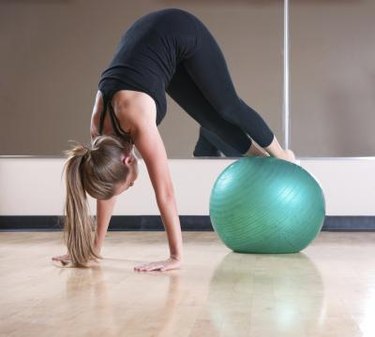
Chin-ups have long been the go-to exercise for people looking to strengthen their latissimus dorsi. These broad, flat muscles sit along the lower and middle part of your back and assist with moving and stabilizing your shoulders.
Many people, however, do not have the luxury of having a chin-up bar to use at home. Fortunately, you can still strengthen your lats with many different and convenient exercise techniques.
Video of the Day
Video of the Day
Press-Up
Press-ups facilitate scapular or shoulder blade depression, another important action of the latissimus dorsi muscle.
How To: Sit in a chair and place both hands firmly at your side under your shoulders. Push down into the chair and lift your body off it as your bring your shoulder blades downwards. Hold this position for 5 to 10 seconds and then lower your body back down again.

Pikes
The lats play an influential role in stabilizing the shoulders against the instability of an exercise ball in this challenging exercise.
How To: Begin in a plank position with your hands under your shoulders and your feet propped up on an exercise ball. Keeping your arms and legs extended, bend at your hips as you raise your buttocks in the air like an inverted "V". Your spine should remain straight and your abdominal muscles should be engaged throughout. Maintain this position for 5 to 10 seconds and then return to the starting position.
Resisted Internal Rotation
This exercise uses a band to challenge your shoulder while it internally rotates. This motion is one of several with which the lats assist.
How To: Stand next to a door with your right shoulder closest to it. Secure one end of a resistance band in a door and hold the other end in your right hand. With your elbow bent at a 90 degree angle and pressed against your side, rotate your forearm away from the door and towards your stomach as you build tension in the band. Hold this position for 1 to 2 seconds and then return to the starting position. After a set, repeat the exercise with the other arm.
Shrug
According to a study published in the American Journal of Sports Medicine, shrugs are an effective way to target your latissimus dorsi along with the trapezius and subscapularis muscles.
How To: Stand with the middle of a resistance band under your feet, that are about shoulder-width apart. With one end of the band in each hand, shrug your shoulders up towards the ceiling. Then, roll them backwards and slowly back to their relaxed position again.

Push-up Plus
This push-up exercise uses the weight of your body to activate the latissimus dorsi muscles.
How To: Get into a push-up position with your hands placed just outside your shoulders at chest level. Begin by bending your elbows and slowly lowering your chest to the floor. When you are a few inches from the ground, straighten the elbows again and raise your body back up. As you do this, complete the push-up at the top of the motion by rounding your upper back and bringing your shoulder blades forward for a second or two before returning to the initial position.
Resistance Band Pull-downs
Pull-downs work the lats by forcing them to move your shoulders backwards and closer to your body against the resistance of a band.
How To: Tie a knot in the middle of a resistance band and secure it in the top of a door. With your arms elevated over your head and your elbows extended, grab one end of the band in each hand. Then, bend your elbows as you pull the band down and back towards your sides. As you do this, squeeze your shoulder blades together. After a 1 to 2 second hold, release the tension in the band.
Recommendations
When trying to strengthen a specific muscle group, it is important that the exercises you perform are fatiguing, but not painful. Two sets of nine to 11 repetitions of each lat exercise can be performed with a 2 minute break in between sets. This should be done three times weekly.
- The American Journal of Sports Medicine: Electromyographic Analysis of the Glenohumeral Muscles During a Baseball Rehabilitation Program
- Journal of Orthopaedic and Sports Physical Therapy: Core Muscle Activation During Swiss Ball and Traditional Abdominal Exercises
- The American Journal of Sport Medicine: Electromyographic Activity and Applied Load During Shoulder Rehabilitation Exercises Using Elastic Resistance
- Nutrients: Protein Supplementation Does Not Further Increase Latissimus Dorsi Muscle Fiber Hypertrophy after Eight Weeks of Resistance Training in Novice Subjects, but Partially Counteracts the Fast-to-Slow Muscle Fiber Transition